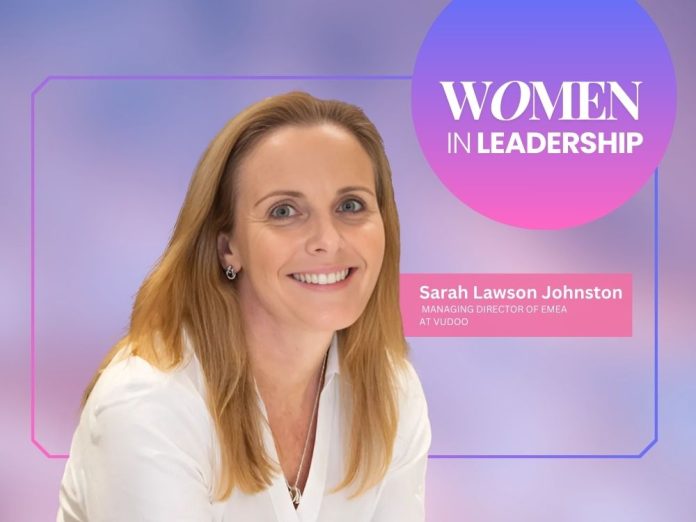Interview with Sarah Lawson Johnston of Vudoo
Video content is rapidly evolving into a direct sales channel. Sarah’s career in adtech showcases a consistent drive to explore what’s next, from the foundational days of ad software to pioneering user-centric personalization. Now leading EMEA at Vudoo, she’s at the forefront of shaping the future of shoppable video. In our exclusive interview with Vudoo EMEA Managing Director Sarah Lawson Johnston, discover how your brand can capitalize on this significant opportunity in 2025.
Hi Sarah. Could you share your journey to becoming a leader in the adtech industry?
I’ve been immersed in advertising from the start of my career and still get excited by how dynamic and innovative it continues to be. For me, it began in client services for a business developing software serving the advertising industry. I spent 20 years there, seeing the company emerge through acquisition to become Mediaocean, an ad tech platform powering ad campaigns from planning, buying, selling and analysis, through to payments. For the last four years, I led the EMEA business as Managing Director for Europe.
Maintaining my keen interest in advertising and technology, I was EVP, Managing Director of Agency Partnerships in EMEA for Hudson MX, which offered an ad agency media buying and accounting platform. Most recently, I was part of the team at Covatic that helped launch the first user-centric personalisation solution, allowing media companies to deliver relevant, targeted ads while maintaining consumer privacy and protecting people’s identities. And since the end of last year, I’ve been Managing Director, EMEA at Vudoo.
What are you most excited about in your new role?
I love having the opportunity to bring my advertising, technology and leadership experience into an untapped area that has enormous growth potential.
In every role I’ve had, I’ve sought to drive growth while continuously learning, and evolving myself. Vudoo represents a new area of advertising to me and a fresh challenge, which is exactly what excites me and motivates me to be here. I’m getting to educate the market on why turning content into shoppable moments is the future, build a business and grow revenue: what’s not to love?! And it’s a privilege to work with a sharp, nimble, dedicated team of experts who support and inspire me every day.
How can brands effectively leverage shoppable video in 2025?
It all comes down to recognising that content and commerce are not distinct. There are enormous benefits of integrating commerce into their content for businesses and buyers. It’s a natural fit to create native shopping experiences – where products promoted via video are integrated naturally into the content – so consumers can discover, engage with and ultimately buy within one platform.
We constantly hear how complex purchase paths are, that buying decisions are taking longer, and digital advertising is bringing friction into customer journeys. Well, shoppable, interactive video ads address all these issues.
The wave of social commerce available today on platforms like TikTok is setting an expectation with consumers of how an online purchase experience should be and this is now extending to the open web.
First-party data, including purchasing history and loyalty programme information, enables personalised experiences that improve the consumer experience. And by allowing consumers to select the content they want, they are receiving a more immersive experience that compresses the purchase path and delivers immediate opportunities to buy via a seamless checkout and payment approach. Brands also have the metrics they need to learn and adapt their strategies, so their content is continually optimised.
The wave of social commerce available today on platforms like TikTok is setting an expectation with consumers of how an online purchase experience should be and this is now extending to the open web. It’s now time to do the same with brand and agency C-suite and their sales teams so they recognise the value shoppable media can deliver.
What e-commerce trends can we expect to see happening throughout the rest of this year? And how should retailers and brands respond?
As has always been the case, we’ll see tech innovations continue to deliver new capabilities — eCommerce is being shaped by the convergence of retail media, AI-driven personalisation and the growing demand for more seamless experiences across every digital touchpoint. While I know it can be challenging, retailers and brands must adapt to a landscape where commerce is no longer confined to traditional retail sites but extends across the open web, social platforms and even streaming environments. They should prioritise developments that allow them to offer their consumers better experiences because delivering this enormously affects their willingness to buy. Get this right, and the money will follow.
Of course, they should constantly pay close attention to consumer feedback — both solicited and observed via signals of interaction. It helps them improve people’s experiences and ensures they can adapt to changes in behaviour and needs so they remain relevant. Commerce media is evolving into a full-funnel strategy and is no longer just about conversion at the bottom of the funnel. Brands and retailers must consider how commerce media can drive upper-and-mid funnel engagement, using immersive storytelling and interactive ad formats to build brand affinity and awareness.
What’s the biggest lesson you’ve learnt in your career to date?
Always be honest, authentic, and straightforward. In doing so, you build trust and confidence with people, which is critical in business and your personal life.
So many issues stem from a lack of trust, which manifests itself in poor communication. But if you approach every interaction with these in mind, then everything becomes easier, and people appreciate it. The whole notion of communicating correctly is also a good lesson for our industry, where a fixation with jargon and trying to sound smart often alienates employees, clients and consumers.
As someone who works in technology, I always think it’s essential to be curious. Understanding how things work and what they do or can do is vital if you’re trying to sell it and build business. Then, it’s a case of translating these insights into easy-to-understand terms so you can sell the benefits simply.
What can workplaces do to support women better in the workplace?
Right now, they must double down on the relationship between the work environment and employees and be committed to equality. This is critical at a time when global businesses are responding to Donald Trump’s anti-DE&I agenda and backtracking on their diversity initiatives.
Culture is important because if it is strong and central to a business, it should be capable of weathering any short-term political storms.
Companies need to reassure women that hard-won progress will not be lost, and the leadership will continue to strive for equality across their organisations. This means culture is important because if it is strong and central to a business, it should be capable of weathering any short-term political storms.
So, if you’re a business, make sure you celebrate contributions from all your staff, cultivate open dialogue and education between employees, and create clear frameworks that ensure all negative behaviour is always recognised, called out, and corrected.
What would your advice be to women starting out in ad tech?
The ad tech industry is fast-moving, complex, and full of opportunities—but stepping into it can feel overwhelming at first. My advice, which applies to anyone starting out, is to embrace curiosity and never let a lack of knowledge hold you back. No one knows everything, and the key to success is being open to learning. Understanding the jargon in ad tech is important, but don’t let it dominate how you communicate.
Most importantly, don’t wait to be invited to the table: take your own seat. Speak up, share ideas, and ask questions. Every voice matters, and confidence grows with experience. Finding a mentor can provide invaluable guidance and accelerate your career. Likewise, building strong relationships across the industry isn’t just beneficial; it’s essential. Networking opens doors, sparks collaborations, and makes your journey more rewarding.
And as you progress, remember that where you work matters. Early in your career, it’s about gaining experience, but as you grow, ensure your values align with the company you choose. The right environment will not only make you more successful but also make the experience far more enjoyable.





































